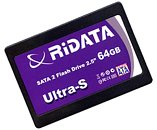Wednesday, July 2nd 2008
RiData Presents Single Level-Cell SSDs
Advanced Media, Inc., is a manufacturer and marketer of the popular Ridata brand of recordable DVD media, electronic storage products, and digital media accessories. The company is pleased to announce the Ridata Single Layer Cell (SLC) 2.5" IDE Ultra-S to its award-winning Ridata Solid State Drive (SSD) product line up. IDE is an established interface that is pin-to-pin compatible and eliminates setting the BIOS on installation. The Ridata SLC 2.5" IDE Ultra-S 16 and 32GB are now available, the 64 GB arrives in Q3 2008."The reliability and performance benefits of the Single Layer Cell (SLC) SSD structure is vastly superior to a hard disk drive or MLC SSD for the environmentally rugged conditions of the industrial marketplace," remarked Harvey Liu, Advanced Media President. It's ideal for ruggedized laptop or Linux users to replace hard drives with a storage IDE interface. "Add the benefits inherent to SSD of cool and silent running; fast data access times; dependability; plus shock and vibration resistance. For critical industrial applications, SLC is the better option."
About Single-Level Cell (SLC)
SLC stores one bit of data in each cell versus MLC that stores 2 bits per cell. SLC leads to faster transfer speeds, lower power consumption and longer cell life. Although SLC is a little more costly, the added uptime, reliability and speed offsets additional pricing. SLC flash technology is currently used in high-performance memory cards, mobile devices, and desktop applications or for embedded storage systems.
The Ridata 2.5" Ultra-S IDE SSD drive is based on NAND flash technology. It has no moving parts, which allows it to be virtually silent, vibration resistant, run cooler, and use less power than a traditional hard disk drive. The Ridata SSD drive provides consistent performance in a variety of harsh environments using low-power consumption.
The drive offers a sustained read speed of up to 50 MB/per second and a sustained write-speed of up to 45MB/per second. It supports the Industry Standard IDE (ATA) Protocol ensuring it is fully compatible with devices and operating systems that use the IDE 44-Pin standard. Inherently resistant to vibration, shock, and temperature extremes, it is very reliable with more than 4,000,000 hours Mean Time Between Failures (MTBF). The Ridata SSD is lightweight with dimensions of 100 x 69.8 x 9mm.
SLC offers static wear leveling and bad block management for data integrity. With S.M.A.R.T. features, low power consumption and a write endurance cycle (P/E) of more than 100,000 times, the SSD drive securely writes and stores vital data.
About Single-Level Cell (SLC)
SLC stores one bit of data in each cell versus MLC that stores 2 bits per cell. SLC leads to faster transfer speeds, lower power consumption and longer cell life. Although SLC is a little more costly, the added uptime, reliability and speed offsets additional pricing. SLC flash technology is currently used in high-performance memory cards, mobile devices, and desktop applications or for embedded storage systems.
The Ridata 2.5" Ultra-S IDE SSD drive is based on NAND flash technology. It has no moving parts, which allows it to be virtually silent, vibration resistant, run cooler, and use less power than a traditional hard disk drive. The Ridata SSD drive provides consistent performance in a variety of harsh environments using low-power consumption.
The drive offers a sustained read speed of up to 50 MB/per second and a sustained write-speed of up to 45MB/per second. It supports the Industry Standard IDE (ATA) Protocol ensuring it is fully compatible with devices and operating systems that use the IDE 44-Pin standard. Inherently resistant to vibration, shock, and temperature extremes, it is very reliable with more than 4,000,000 hours Mean Time Between Failures (MTBF). The Ridata SSD is lightweight with dimensions of 100 x 69.8 x 9mm.
SLC offers static wear leveling and bad block management for data integrity. With S.M.A.R.T. features, low power consumption and a write endurance cycle (P/E) of more than 100,000 times, the SSD drive securely writes and stores vital data.

2 Comments on RiData Presents Single Level-Cell SSDs